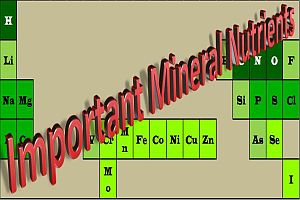No one should underestimate the importance of getting adequate minerals in our daily diet. Composed of metals and other inorganic compounds, minerals are just as important as vitamins when it comes to the proper functioning of the human body’s systems. And since the body cannot produce its own minerals, we must get them from the food we eat.

While many common minerals, such as calcium, potassium, sodium and magnesium are required in larger amounts, others are only necessary in trace amounts. However, modern farming practices have depleted the soil of some of these important trace minerals, resulting in a greater risk of mineral deficiencies in the overall population. A 1992 study found that the mineral content of soil in the U.S. was 86% lower than it had been a century before.
Minerals are needed in order for our body’s enzymes to work and to facilitate the transport of nutrients across cell membranes. Without minerals, our cells would essentially starve. Minerals are responsible for proper conduction of nerve impulses, for the contraction and relaxation of muscle tissue, and they help regulate tissue growth.
Following is a short overview of some of the most important minerals for our health:
* Calcium supports bone formation, muscles, the heart and the digestive system. A persistent feeling of “pins and needles” may indicate a calcium deficiency. Other symptoms include rashes and muscle cramps. Magnesium is necessary for the proper absorption of calcium.
* Copper helps the intestines in the absorption of iron from food. Copper deficiency sometimes leads to anemia, as low copper intake makes iron absorption far more difficult.
* Iodine is key to the production of thyroid hormones, particularly thyroxine. Seafood and seaweed are the best sources of iodine. In areas where seafood is scarce, governments often add iodine to salt or other foods. Iodine deficiency can cause goiter and mental problems.
* Iron is particularly important to red blood cells, as it allows our blood to transport oxygen. Insufficiency iron in the diet leads to anemia, whereas too much iron can cause serious liver problems.
* Magnesium is used mainly by the bones and teeth. Although it is necessary for calcium absorption, many people do not get enough of this mineral. Low levels of magnesium can cause weakness and muscle cramps, and a severe deficiency can cause cardiac arrhythmia.
* Manganese is used for enzyme production, and is also important for wound healing. Those with low levels of manganese heal very slowly.
* Molybdenum is needed in trace amounts for the development of the nervous system, waste processing by the kidneys, and cellular energy production.
* Phosphorus is a major component of teeth and bones and plays a key role in the body’s system of energy storage. It is also integral to many of the body’s chemical reactions.
* Potassium works with sodium in the regulation of the body’s energy supply. It also supports the nervous and digestive systems. Muscle cramps and high blood pressure are the most common deficiency symptoms.
* Selenium is most important for the health of the thyroid gland, the heart and cartilage. Low levels of selenium can lead to thyroid disease.
* Sodium helps to regulate the body’s energy supply and supports the nervous and digestive systems. Too little sodium can cause headaches, nausea and confusion, whereas too much sodium causes weakness, lethargy and edema.
* Zinc is important for the production of healthy sperm and is necessary for several liver functions. A lack of zinc causes sensory problems as well as hair loss and skin lesions.
